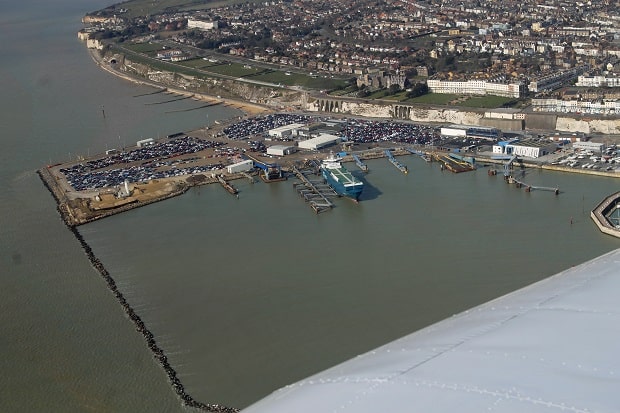
Use of the Port of Ramsgate for ferry operations is being examined by Thanet council once more.
The last ferry to operate from Ramsgate was TransEuropa Ferries which went bankrupt in 2013 and left Thanet council with £3.4 million in unpaid berthing fees.
Since then a succession of ‘proposals’ have been mooted but not amounted to anything, including most recently the ferryless ferry firm Seaborne Freight that was awarded a £13.8million government contract in December 2018 for extra ‘Brexit-resilience’ crossings but in 2020 went into liquidation owing almost £2 million.
Now, Thanet council says the award to Ramsgate of £19.8million from the government Levelling Up Fund means it is now feasible to carry out improvement works such as the creation of HGV check-in booths and Border Control/Customs infrastructure and modernisation to lighting, fencing, waymarking and lane separation, at the port needed to host a cross-Channel service.
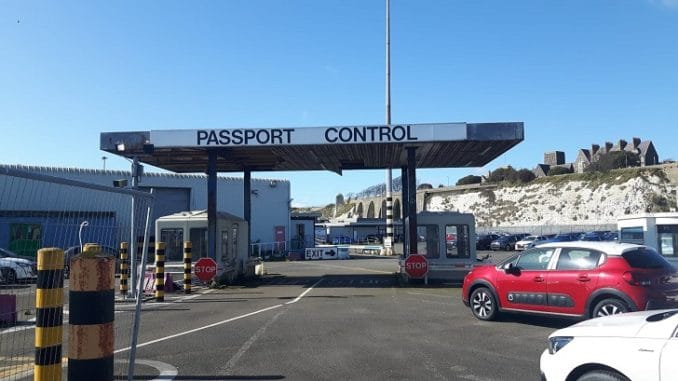
In a council newsletter it says: “Some £9.62m of the Government LUF for Ramsgate is set aside to improve the Port, essentially to help us take things to the next level. The aspiration is to see the Port thrive, bringing more jobs, more opportunities for training and skills, establishing it as the ideal base for supporting the green industry.
“There is optimism for the future and we acknowledge that we need to continue to explain our rationale and to give the reassurance that this will mean action and not just words.
“The last time the port hosted a commercial ferry operation was in 2013. There was also some talk of a new operation which never quite arrived, so some scepticism is understandable.
“So what makes it attractive now? The landscape has changed. Things like increasing fuel costs and the prospect of more complicated border crossings improve the case for Ramsgate. The improved motorway network offers an alternative route to the M20, and the dedicated tunnel diverts traffic away from the town. Ramsgate’s ideal location, close to the continent, enables short sea crossing times. There is a real business case to host freight crossings again.
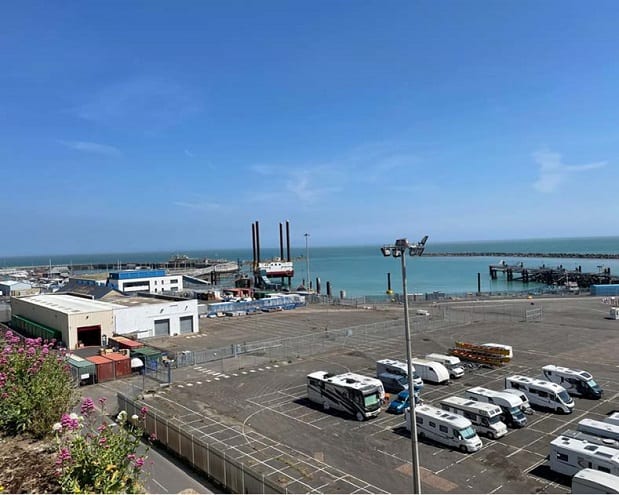
“Significantly, the LUF investment also removes one of the biggest hurdles that prevented this from happening before; the need for improvement works to the Port infrastructure to be able to deliver a modern cross channel freight service.
“This includes work to the berths, the creation of HGV check-in booths and Border Control/Customs infrastructure and modernisation to lighting, fencing, waymarking and lane separation.
“The extent of the work needed to make it viable was beyond the financial capability for us as a local authority. Now, thanks to Government funding we can do the work ourselves to bring the change which we believe will unlock new opportunities with potential operators.
“Our plans go beyond a potential new crossing and as our bid for the LUF identifies, this has to be supported by what we call ‘diversifying our offer’. Basically, we need to do more in the space we have to make it more successful! That’s why we’ll be delivering other projects like the Green Campus too.”
The Port of Ramsgate, at 34 acres, is owned and operated by Thanet District Council – some of the site is Crown land. It is one of 23 municipal ports in England and Wales and is currently used by a variety of maritime businesses. Companies like London Array and Vattenfall choose to be based in Ramsgate so they can service the 320 wind turbines out in the Channel. Brett Aggregates is also located at the port and supplies materials to the building trade.
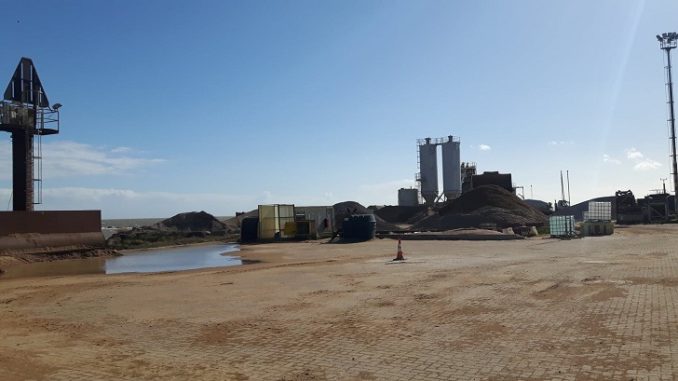
The Port has been haemorrhaging money since at least 2010 . In the 2020/21 financial year Thanet council recorded a port loss of some £2million according to its statement of accounts. This now brings the total over the last 12 years to more than £25m, not including capital spend on projects such as berth 4/5.
The aggregate berth (Berth 4/ 5) was decommissioned and removed in November 2020. Construction work on the new berth started earlier this year, following the completion of an Environmental Impact Assessment (EIA) and the granting of both planning permission and a Marine Licence.
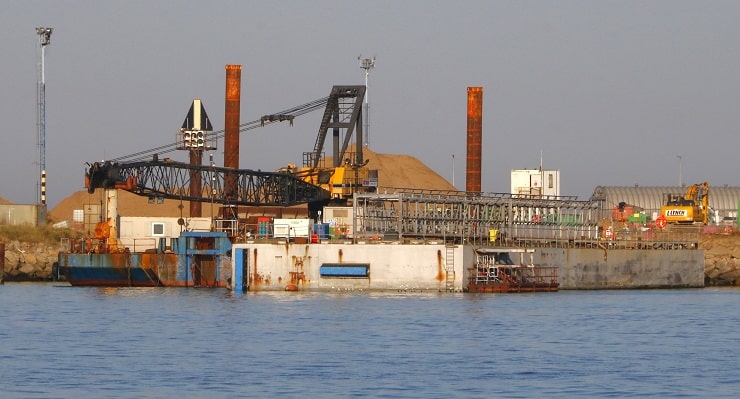
Major parts of the work such as the dredging, piling and installation of the new berth itself are now complete. One of the two gangway bridge sections has also now been installed which will link the floating berth back to land.
The project had originally been programmed for completion at the end of August but some land-based parts of the project and ancillary work on the floating berth continues this month.
The 119m replacement berth consists of a floating pontoon held in place by steel piles. A hinged gangway provides access whilst accommodating tidal movement. The berth is longer and wider than the previous 70m long berth.
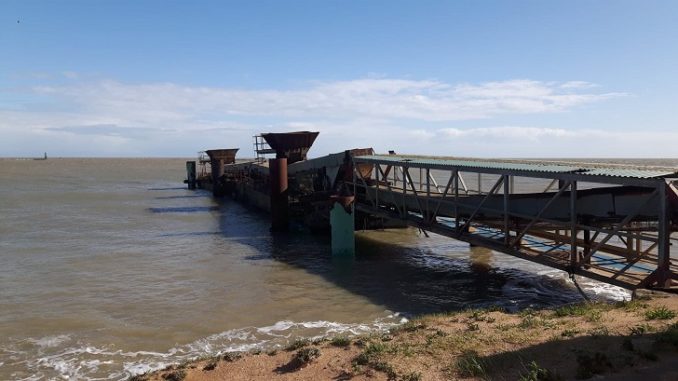
The contract for the berth was awarded to the firm that previously had its direct deal offer of two-for-one pontoons rejected by Thanet council.
The pontoons, owned by construction firm Bam Nuttall, had been the subject of the deal and destined to provide a new berth 4/5 at the port and to provide extra berthing for wind farm vessels at the Royal Harbour.
Councillors were asked to approve the £1.4million decision to buy the two 75 metre barges but members opted to reject the plan in December 2019.
However, it was put it out to tender but dropping proposals for the second pontoon at the harbour. The contract was then given to Bam Nuttall. One pontoon is now in place at berth 4/5 and the other was finally towed from Ramsgate’s East Pier to Medway last month.
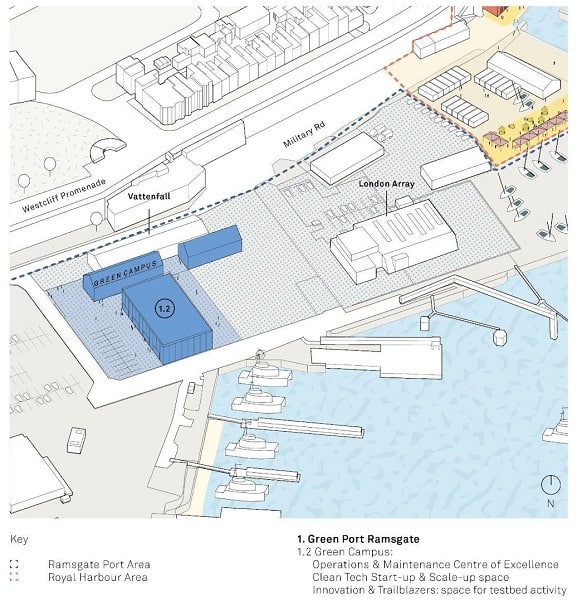
The Levelling Up Fund includes proposals to regenerate the site with a ‘Green Port’ projected to create 800 jobs, a Green Hub training centre for apprenticeships and training, hospitality and fishing fleet proposals.
The Ramsgate project also includes a training hotel and restaurant at the Smack Boy’s building at Ramsgate harbour, a brasserie and a fishing facility for the local fleet to store and sell catch from; a new town square on the current pier yard car park, a refurbished clock tower building and two community sites in Newington and Ramsgate with training kitchens and community teaching.
Thanet council is due to publish a ‘Port Narrative’ setting proposals out in further details and including a summary for the Green Campus.
7 port ‘proposals’ that never got out of the starting blocks
October 2012

Euroferries announced it would be operating a 102m trimaran high speed service from Ramsgate by 2013.
2014/15

Euroferries again announced it would be launching a Ramsgate to Boulogne service. It had also approached Thanet District Council back in 2009. No service emerged.
Thanet council issued a statement to say: “Thanet District Council can confirm that there is no agreement with Euroferries Express ltd. to facilitate a cross-channel ferry service between Ramsgate and Boulogne.”
August 2014
Thanet council advised that talks were underway with potential ferry operators with names touted including DFDS.
September 2015
Ferry expert Bill Moses said he planned to relaunch ferry services at the port
His plans were for an operator to carry up to 500,000 passengers by its second year of operation at Ramsgate.
November 2016

It was revealed that Thanet council had failed in a bid to get Government funding of £4.17million, to be matched with £2million from the authority, to carry out plans which could double lorry capacity at the port to one million vehicles a year.
A three phase expansion was planned.
The first phase was to improve the port’s handling capacity, particularly for unaccompanied freight vehicles, with a double deck ro-ro berth.
The second phase was the development of an on-port new alongside quay for the existing aggregates cargo and bulk cargo expansion and secondly an off-site freight logistics hub at Manston Business Park.
A third phase of seaward port expansion would have been dependent on demand.
April 2017

The shipping expert taken on by Thanet council said the authority could buy its own ferry to run cross-Channel services from Ramsgate.
Robert Hardy, of Paradox Consulting, was one of the Ramsgate representatives who attended the industry Multimodal expo in Birmingham.
Talking to Shipping TV Mr Hardy said: “We have got to write a model as though we are starting our own ferry company. In fact I asked the question when I was brought in why don’t we buy the ferry, why are we relying on someone else to share our view?”
Thanet council later issued a statement to say: “The Port does not intend to either purchase or operate ships ourselves.”
August 2017
A tweet emerged ‘revealing’ Thanet council discussions with a Polish ferry company about bringing services to Ramsgate Port.
The council’s then-consultant Robert Hardy was believed to have been in talks with Polferries.
2017-2020
The saga of Seaborne Ferries begins when the company entered negotiations with Thanet council over a proposed service in 2017. A start date of March 2018 came – and went- with not a ferry in sight.
It followed an announcement by former Ostend mayor Johan Vande Lanotte in October 2017 that a ‘basic agreement’ had been made for the ferry line.
In August 2018 Seaborne Freight said it was aiming to begin sailings at the end of the year – and launched a website advertising the route.
During the Christmas period of that year news emerged that Seaborne Freight had been awarded a government contract worth £13.8million to provide extra ferry capacity to UK ports in the event of a no deal Brexit– despite having no ferries and no track record.
By January 2019 Britain and Ireland’s largest union, Unite, called for then transport secretary Chris Grayling to resign in the wake of the ‘no-deal Brexit’ ferry service contracts.
The £107 million deal with three firms, including Seaborne Freight, was slammed for ignoring the role of Eurotunnel. At the end of the month a Parliament select committee questioned the legality of the government contract awards to the three ferry companies, particularly Seaborne Freight.
In February 2019 the government contract with Seaborne was terminated. The Department for Transport said the agreement has been axed as Seaborne would not reach its contractual requirements and the firm’s backer Arklow Shipping has pulled out of the deal.
By September 2020 Seaborne lodged a resolution to wind up with Companies House and a document to say voluntary liquidator Quantuma had been appointed.
According to the documents the firm had assets of around £39,000 in computer equipment, furniture and cash.
But it owed almost £2million, made up of £1.2m to trade and expense creditors, a £400,000 loan, £323,000 in directors loans and a £100 corporation tax bill to HMRC.

